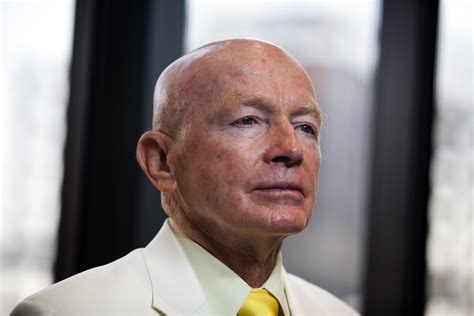A Quote by Steve Jobs
Recruiting is hard. It's just finding the needles in the haystack. You can't know enough in a one-hour interview. So, in the end, it's ultimately based on your gut. How do I feel about this person? What are they like when they're challenged? I ask everybody that: 'Why are you here?' The answers themselves are not what you're looking for. It's the meta-data.
Related Quotes
When you consider the sheer magnitude of investable equities to choose from in the world's emerging markets, you realize that finding one that looks attractive enough to warrant investing your faith and assets in is as formidable a task as finding a needle in a haystack. Fortunately, researching investment opportunities is a lot more interesting than digging for needles in haystacks.
Study hard. Understand not only the questions, but the questioner. Know how best to articulate the answers, but do it with humility, because ultimately the answer is in a person, the person of Christ, not in an argument. So, do your work and know how to present the answer, but do it with gentleness and meekness.
I feel like a lot of people involved with celebrity journalism have interesting ideas about the people they want to write about going into the interview. Then as soon as they actually sit down with that person, they basically ask the questions they think journalists are supposed to ask, and they start viewing themselves almost as a peer of the subject. Like they're going to become friends. That's why most celebrity journalism is so terrible.
Trying to analyze a situation without enough data was like looking at a photograph of a ball in flight and trying to gauge its direction. Is it going up, down, sideways? Is it about to collide with a baseball bat? Is it moving at all, or is something on the blind side holding it in place? A single frame didn't mean a thing. Patterns were based on data. With enough datapoints, you could predict just about anything.
I was spurred by the fact that having worked for women's magazines myself as a journalist, if you go off and interview a female celebrity, I'd just go in and interview them like I'd interview any human being and talk about the things that interested me. And you'd come back, and you'd file your copy. And then my editor would read through my copy and go, why haven't you asked them if they want kids? And I'd be like, well, I don't know, I interviewed Aerosmith last week. And I didn't ask them that.
We get more data about people than any other data company gets about people, about anything - and it's not even close. We're looking at what you know, what you don't know, how you learn best. The big difference between us and other big data companies is that we're not ever marketing your data to a third party for any reason.
I guess there's something about you don't know why you're attracted to a character, but you're attracted to them enough to want to - it's like when a song comes on, and you feel like dancing. You don't know why; you just want to dance. It's hard to analyze that feeling, and if you do, you get far away from it.
A lot of people involved with celebrity journalism have interesting ideas about the people they want to write about going into the interview. Then as soon as they actually sit down with that person, they basically ask the questions they think journalists are supposed to ask, and they start viewing themselves almost as a peer of the subject. Like they're going to become friends. That's why most celebrity journalism is so terrible.
The main thing for me is just the length of time it takes to make a movie. It's at least a year of just talking about it, talking about it with yourself or your director or your other castmates or the press, so you just want to make sure it's a film that although you initially feel this pull or this drive to it, you don't really have the answers to why you're drawn to it. But it's more about not knowing the answers to certain questions but wanting to go on the journey of discovery to find the answers.


































